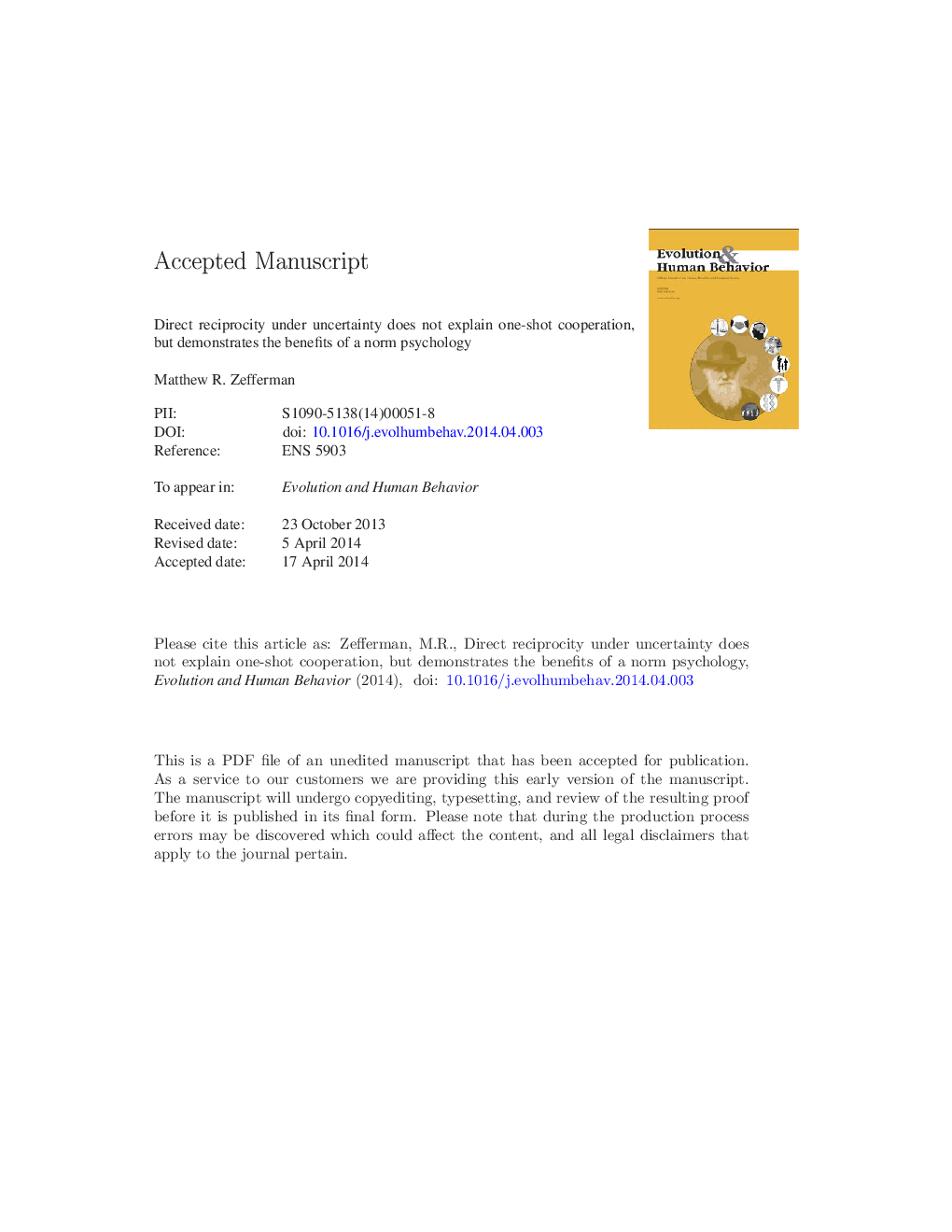| کد مقاله | کد نشریه | سال انتشار | مقاله انگلیسی | نسخه تمام متن |
|---|---|---|---|---|
| 10464001 | 925449 | 2014 | 25 صفحه PDF | دانلود رایگان |
عنوان انگلیسی مقاله ISI
Direct reciprocity under uncertainty does not explain one-shot cooperation, but demonstrates the benefits of a norm psychology
ترجمه فارسی عنوان
متقابل مستقیم تحت عدم قطعیت همکاری یک شات را توضیح نمی دهد بلکه مزایای یک روانشناسی معمول را نشان می دهد
دانلود مقاله + سفارش ترجمه
دانلود مقاله ISI انگلیسی
رایگان برای ایرانیان
کلمات کلیدی
متقابل، روانشناسی نورم همکاری، بازی های تکراری
موضوعات مرتبط
علوم زیستی و بیوفناوری
علوم کشاورزی و بیولوژیک
بوم شناسی، تکامل، رفتار و سامانه شناسی
چکیده انگلیسی
Humans in many societies cooperate in economic experiments at much higher levels than would be expected if their goal was maximizing economic returns, even when their interactions are anonymous and one-shot. This is a puzzle because paying a cost to benefit another in one-shot interactions gives no direct or indirect benefits to the cooperator. This paper explores the logic of two competing evolutionary hypotheses to explain this behavior. The ``norm psychology'' hypothesis holds that a player's choice of strategy reflects socially-learned cultural norms. Its premise is that over the course of human evolutionary history, cultural norms varied considerably across human societies, and through a process of gene-culture co-evolution, humans evolved mechanisms to learn and adopt the norms that are successful in their particular society. The ``mismatch'' hypothesis holds that pro-social preferences evolved genetically in our hunter-gatherer past where one-shot anonymous interactions were rare and these preferences are misapplied in modern laboratory settings. I compare these hypotheses by adopting a well-known model of the mismatch hypothesis and show that selection for one-shot cooperation in the model is an artifact of agents being confined to only two strategies: Tit-for-Tat and Always Defect. Allowing for repentant and forgiving strategies reverses selection away from one-shot cooperation under all environmental parameters. Direct reciprocity does not necessarily lead to cooperation, but instead generates many different normative equilibria depending on a group's idiosyncratic evolutionary history. Therefore, an agent whose behavior is evoked solely from non-cultural environmental cues will be disadvantaged relative to an agent who learns the locally successful norms. Cooperation in one-shot laboratory experiments is thus more easily explained as the result of a psychology evolved for learning social norms than as a genetic mismatch.
ناشر
Database: Elsevier - ScienceDirect (ساینس دایرکت)
Journal: Evolution and Human Behavior - Volume 35, Issue 5, September 2014, Pages 358-367
Journal: Evolution and Human Behavior - Volume 35, Issue 5, September 2014, Pages 358-367
نویسندگان
Matthew R. Zefferman,
